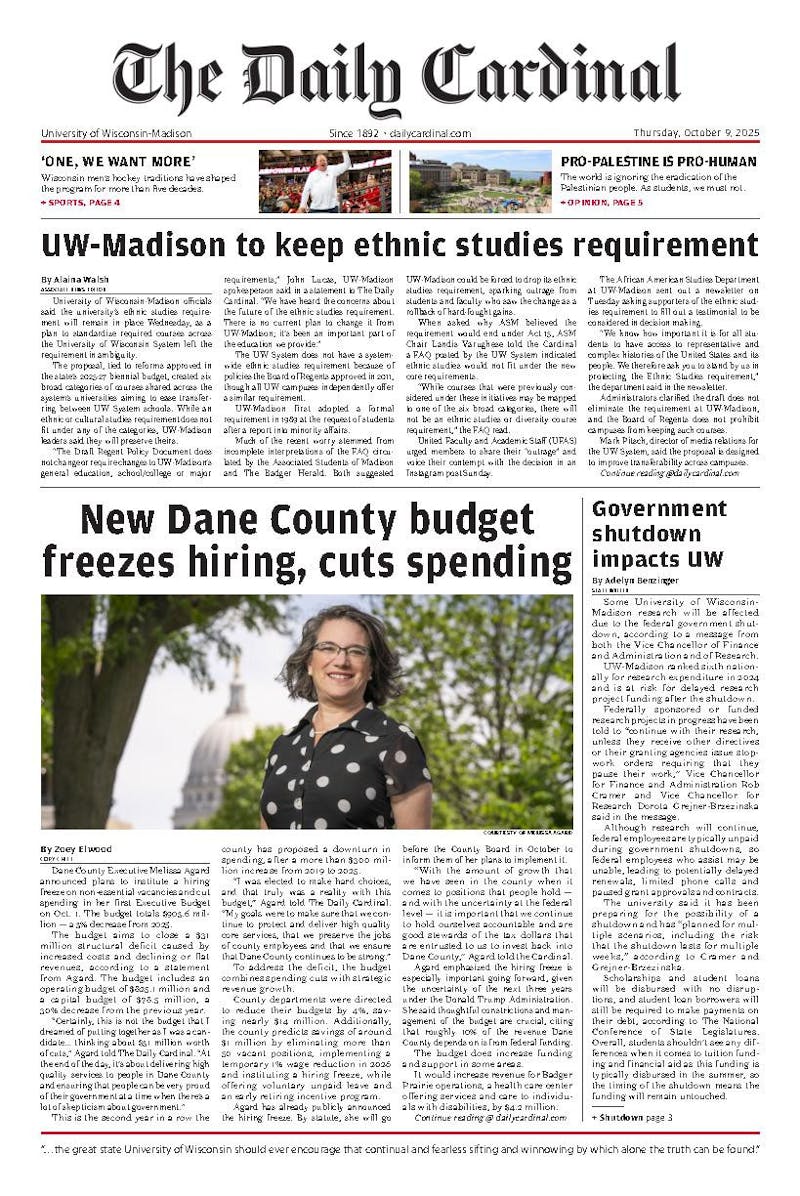The University of Wisconsin-Madison could receive over $55 million in cuts to research funding and student aid resources if Congress fails to reach a consensus on the fiscal cliff, according to a letter sent to Sen. Herb Kohl by UW System President Kevin Reilly and UW System chancellors.
Congress is currently trying to reach a compromise to address the country’s growing debt crisis. The “fiscal cliff” refers to the automatic increase in taxes Jan. 1 as a result of the expiration of Bush era tax cuts that will occur if Congress fails to reach an agreement on policy to raise government revenue. The cliff also includes across-the-board cuts to domestic discretionary spending.
In the letter, Reilly said Wisconsin’s universities could lose approximately $67 million over the next fiscal year if Congress is unable to reach a deal.
UW-Madison would take a majority of the hit with a proposed $55,228,075 in cuts to federal grants and contracts that fund research projects throughout campus.
According to Dan Uhlrich, Graduate School associate dean for research policy, UW-Madison’s research enterprise has a budget of approximately $1 billion dollars, with approximately $600 million of it coming from federal funds.
Uhlrich said UW-Madison always ranks within the top five research institutions for federal funding, so the fiscal cliff would likely affect the research funding if a compromise is not reached.
“We’re hoping that as things get closer and closer to the Jan. 1 deadline the picture will become clearer and clearer what may happen and hopefully we’ll start to get some idea from funding agencies how they will handle things,” Uhlrich said. “We’re still a little ways out from that.”
As stated in Reilly’s letter, two programs that could experience cuts are the National Science Foundation and the National Institutes of Health, both of which provide research funding to UW System institutions.
Uhlrich said it is difficult to know how UW-Madison will be affected because there are multiple scenarios that could play out. Additionally every federal agency will deal with the cuts differently, so it is hard to make any exact predictions.
According to political science professor David Canon, both Republicans and Democrats have “dug in firmly” with their positions. President Barack Obama and Democrats want to raise revenues by increasing taxes on the wealthiest 2 percent of the population, while Republicans are proposing to close tax loopholes and limit tax deductions.
Canon said he believes the Republican proposed elimination of tax deductions for charitable contributions could have an even bigger impact on the university’s funding than reduced sources of research and aid funding. As state support for Wisconsin’s universities continues to decline, the university is becoming increasingly dependent on donations as a source of major funding.
According to the 2011-’12 Data Digest, 19 percent of the university’s funding in 2011-’12 came from charitable contributions.
“If that were to happen I think that would significantly affect contributions to UW and to other big public universities that rely on those contributions because it just wouldn’t be as affordable for wealthy people to make those contributions anymore,” Canon said.
Canon said given Congress’ current partisan divide, a “grand bargain” before Jan. 1 seems unlikely. He said it’s more likely that a temporary compromise will be reached where tax cuts will be extended for the majority of Americans.
According to Reilly’s letter, Wisconsin’s flagship university could also see a $428,626 reduction in student financial aid support, mostly from work study programs and grants.
Michelle Curtis, associate director of Financial Aid, said the cuts to UW-Madison student aid wouldn’t be “catastrophic,” but still a “step backward.”
According to Curtis, an analysis done by the Financial Aid office shows that a little over 300 students would be affected by the cuts to student aid, with approximately $212,000 in cuts to the Supplemental Educational Opportunity Grant and $185,000 in cuts to Work Study.
“It’s not huge but every dollar that we can put into a financially needy student’s hands is important to us,” Curtis said.
However, Uhlrich said he remains optimistic for UW-Madison researchers, who have a strong history of obtaining research funds.
“The competition is going to get a little tougher but our faculty and other scientists have had a very good track record of securing this funding in competitive times,” Uhlrich said. “There’s a good chance many of them will continue to do okay.”






